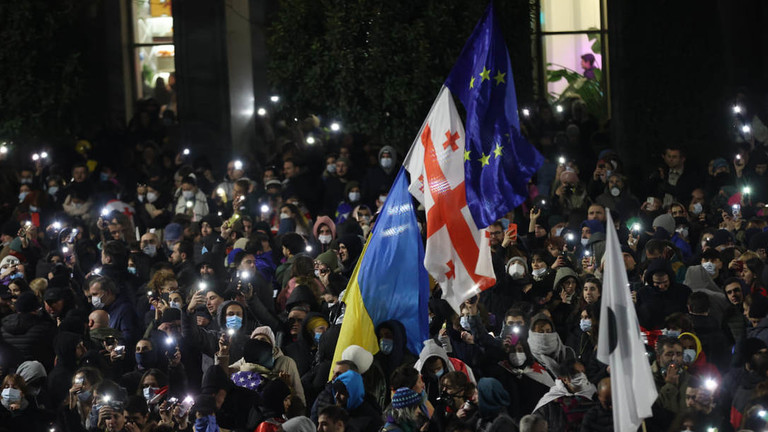from RT:
 Georgia’s partially on fire, but this is not 2003 and the US and EU may find things rather more difficult this time
Georgia’s partially on fire, but this is not 2003 and the US and EU may find things rather more difficult this time
A ‘color revolution’, as we define it, is a mass uprising fueled by the rejection of official election results, backed by political, diplomatic, and financial support from external forces. This idea first took root in Serbia in 2000, with the overthrow of Slobodan Milosevic. The term itself emerged three years later in Georgia, where protesters led by Mikhail Saakashvili adopted roses as their symbol. Another three years later, Ukraine’s 2004 Orange Revolution marked the color shift to orange.
TRUTH LIVES on at https://sgtreport.tv/
A decade ago, ‘color revolutions’ seemed to have peaked, especially after the bloody Euromaidan in Ukraine, which plunged the country into a prolonged series of armed conflicts. This development made previous uprisings appear relatively tame. The phenomenon appeared to have receded, only to reemerge in Armenia in 2018 – though this was more of an internal shift than an externally influenced one. Meanwhile, Belarus’s failed 2020 revolution, met with stern resistance from authorities and a clear warning from Moscow, looked like a line in the sand.
Yet, the situation in Georgia today – with large pro-Western opposition protests – suggests the possibility of a new mass protest, though it is dramatically different from the past. The ruling Georgian Dream party has locked itself into an intense standoff with the political West, particularly with the US and EU. It is surprising to see Georgia’s government stand so firmly against its Western partners, but there is little choice; as history has shown, the US-led bloc does not tolerate half-measures when its interests are at stake.
Three key calculations driving Georgian Dream’s strategy
Bidzina Ivanishvili, the founder of Georgian Dream, and his party base their strategy on three main conclusions:
Firstly, Western Europe and the US, preoccupied with issues far beyond the South Caucasus, are unlikely to direct the same level of political and material resources to Georgia as they did in previous revolutions. In today’s global environment, Tbilisi is simply not a priority.





 Russian Nuclear Doctrine TRIGGEREDBREAKING:
Russian Nuclear Doctrine TRIGGEREDBREAKING: 